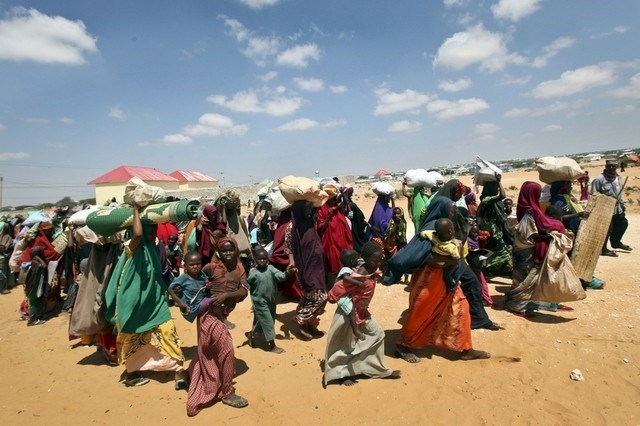
Wednesday April 12, 2017

The UAE has launched a Dh500 million mission of mercy to save hundreds of thousands of Somalian children and their families who are starving to death.
The President, Sheikh Khalifa, issued a directive for a month-long donations campaign to provide suffering Somalis with food, water, medicine and other necessities to help them survive their third famine in 25 years.
Sheikh Khalifa was backed in the call by Sheikh Mohammed bin Rashid, Vice President and Ruler of Dubai, and Sheikh Mohammed bin Zayed, Crown Prince of Abu Dhabi and Deputy Supreme Commander of the Armed Forces.
The month-long campaign, "For You Somalia", will call for donations across the country and will include an April 21 telethon on several TV stations.
Fahad bin Sultan, deputy secretary general of the Emirates Red Crescent, said financial support was urgently needed.
"We are looking at no less than Dh500m in aid for Somalia," Mr bin Sultan said. "We’re starting with a budget of Dh100m, and we expect a minimum Dh400m in donations as soon as possible, before Ramadan."
"The situation in Somalia is very bad. They are weak and dying because there’s no food, the wells are drying up and they are displaced from the drought and from the war.
"Many Somalis have also fled to neighbouring countries – to South Sudan and Kenya."
Among the first to donate was the Mohammed bin Rashid Humanitarian and Charity Establishment, which last night gave Dh5 million for humanitarian aid projects in Somalia.
About 360,000 Somalian children are estimated to be suffering from acute malnutrition, the UN warned on Tuesday.
The world body said drought was threatening half of Somalia’s population – 6.2 million people – with famine.
A team from the Emirates Red Crescent will fly out on Sunday to Mogadishu, where it will work with the charity’s Somalian branch to assess the immediate needs of the people and deliver 10,000 food parcels.
Another 200,000 food parcels for children and 50,000 for families is expected to arrive by relief ship within 10 to 15 days.
The UAE charity’s Dh100m will go towards food, medicine, medical supplies, serums for vaccination and prevention of epidemics, clothing, and cash for health, education and housing, including the rebuilding of wells. It will also provide half a million bottles of water and water tanks.
The mission comes after Sheikh Mohammed bin Zayed met Mohamed Abdullahi Mohamed, president of Somalia, in Abu Dhabi on Monday.
The campaign will be monitored by Sheikh Hamdan bin Zayed, Abu Dhabi Ruler’s Representative in the Western Region and President of the Red Crescent Authority.
The UN on Tuesday told of the growing risk of mass starvations among people living in conflict and drought-hit areas of the Horn of Africa, Yemen and Nigeria.
It said an "avoidable humanitarian crisis is fast becoming an inevitability".
The UN faced a severe funding shortfall to help people affected by famine, spokesman Adrian Edwards said.
UNHCR’s operations in famine-hit Nigeria, South Sudan, Somalia and Yemen are funded at between 3 and 11 per cent, he said.
More than 20 million people across the four countries are in areas hit by drought and are experiencing famine or are at high risk of it.
Mr Edwards said the growing food insecurity was pushing more and more people to leave their homes across the region, with food needs the main factor for displacement in Yemen and South Sudan.
"In Sudan, for example, where our initial estimate was for 60,000 arrivals from South Sudan this year, we are in the process of revising the expected total upwards to 180,000," he said.
Mr Edwards said the lack of funding meant less food distributed to those who need it most – the more than four million refugees in the region, most of whom are children.
"With no money to buy food, rations are being cut," he said.
In Djibouti rations have been cut by 12 per cent, in Ethiopia, Tanzania and Rwanda by between 20 and 50 per cent, and in Uganda by up to 75 per cent, Mr Edwards said.
This could have dramatic consequences, he warned, because "many refugees are without full access to livelihoods and agriculture or food production, and their ability to take matters into their own hands and help themselves is limited".